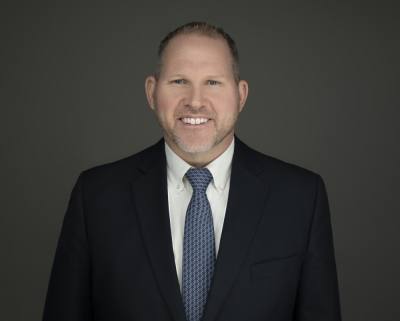Corey Homer, a commercial real estate sales agent, is a former MISD employee and the parent of an MISD student, his campaign website states. He earned over 68% of the 2,821 votes cast in the Place 3 race against his opponent and the former trustee, Chad Green, according to results from the Collin County Elections Office.
Kenneth Ussery, a Realtor and life coach, has been elected and served on the board previously. He has also served the district through various district committees, planning teams and campus-level organizations, his campaign website states. Ussery earned over 62% of the 3,654 votes cast in the Place 2 race against opponent Deborah Kloskey, according to results from the Collin County Elections Office.
In an interview with Community Impact, Homer and Ussery spoke about their experience serving on the board since being elected, as well as their aspirations for the district. Answers have been edited for length, style and clarity.
1. How has the beginning of your term gone so far?
Homer: I've been pleased with the term, I've been pleased with the things that we've been able to do as a board. ... We've been able to adopt a budget, we've set the tax rate. Just trying to continue to move forward, just trying to take care of the financials for the upcoming year. I'm so thrilled to be able to serve in this capacity and accept the responsibility of being a trustee for the McKinney ISD school board.
Ussery: Very, very busy. ... Over the summer, the school board has the responsibility of adopting the next year's budget and setting the tax rate. With all of the funding deficits coming down from the state, some decisions had to be made. Those are some pretty major decisions that have to be made right off the bat. Couple that with all the activities like the new teacher breakfast, where we had an opportunity to get to know the new staff, which was super fun, and then convocation, and then our first board meetings, the first day of school. And then there's some initial training that has to happen for new school board members. ... This is kind of a lot here at the very, very beginning. When I was on the school board several years ago, it was a different time. ... I'm having to probably unlearn some things that I knew from before in order to relearn based on today's culture and climate, and just the changes that have happened in education from back when I was on the board before versus how it is today.
2. What are the top three things on your to-do list as a board member for the upcoming school year?
Homer: I did not have, and I still don't have, an agenda for ‘This is why I'm running it, because I want to do this, this and this.’ I don't have that. That was not on my heart, that was not on my mind to do. I don't have a personal agenda. But my agenda for McKinney ISD is number one, just making sure that our students are safe ... with a safe learning environment, and our teachers have a safe teaching environment. If that's not happening, learning can't take place. Make sure that the decisions I make on each thing that I can vote on, I'm going to put our students first. I'm going to put our staff and our administrators, and then our parents. Those four groups are the reason, that's why we're here, to govern this independent school district, in the best way, in the most financially fiscal way that we can.
Ussery: We are in an unprecedented time in public education where we are not receiving the support that is needed from the state level, there's a lot of bizarre decisions that's being made at the state level that's being filtered down to the local school district that's really causing a lot of challenges for local school districts. That's not just McKinney, that's every public school district in the state of Texas. ... The first priority is making sure that we are [a] legal school district, so that we are fulfilling legally what's being required from us, whether we agree with it or not. In the midst of the flurry of all of those decisions, it is making sure of two things. One is that our teachers are well taken care of, that they have what they need when they need it. That is paramount for me is to make sure that our teachers know that they are supported and encouraged, and that we are resourcing them to the very best of our ability. ... It's making sure that our students are getting the absolute best education that they possibly can all across the board, and that they're receiving the best education in the safest and the most productive environment that, as a school district, we are capable of providing for them.
3. During the recent legislative session and two special sessions, a number of school district officials have said that the updated allocated education funding isn't enough for local school districts. What are your thoughts?
Homer: Any board member or superintendent, anybody that's in charge of making decisions for financials for the district, everyone would like to have more, because it makes things easier to get things done. When the state is asking us to do things ... they're sending out mandates, and they're not funding those mandates. That requires us to have to use [funds] that we weren't planning to have to use on whatever it is that they passed. That is part of the problem; it creates [a] deficit, you know. We're excited that Texas got what we got. I still don't think that it's enough. I think they need to allocate more, but we're going to do the best with what we got from the state and do our job to make sure that our folks are being taken care of, our students, our teachers, our administrators.
Ussery: These mandates—they are lofty, and here's the thing, I'm not opposed to a lot of the mandates, I think that they're great mandates, but the schools have to be able to afford to fulfill them. The only way we get money is through what the state says that we can have. So if you're going to mandate it, that's fine, but give us the ability to mandate what you're requiring of us. ... We will do what we can as a school board, individually and collectively, to try to accomplish everything and to push back on things that are not just and not right, but at the end of the day, we don't have a choice but to do what's being required of us. MISD, for years and years, has been so fiscally responsible that there are some dollars set aside in what's called the fund balance, and we're able to pull from that, and we will pull from that in order to accomplish what we have to, but it's like anybody else who has a savings account, your savings accounts only going to last so long, and then there is no savings account.
4. What is the biggest opportunity that the school district administration has for this school year?
Homer: I believe that we are about to see something great happen this school year, and we just saw something great happen, too. With our [A-F accountability] scores that just got released, we've continued to show improvement. Our district gained four points overall. We're sitting now at an 88, and I think that’s a testament to our students, our teachers, our administrators, the organization of the district. This past school year has been a huge leap, and what I'm expecting to see this year is that we have another year like that, as far as our academics are concerned.
Ussery: Our A-F rating—we rated an 88, which was an improvement on the A-F accountability system. I think one of the opportunities that we have this year moving forward is to do absolutely everything that we can from classroom level up through administrative level and the school board level, to do what we can to try to increase that score, to improve that score. We would obviously all like to be in the ‘A’ category and not in the ‘B’ category. One opportunity we have is just to keep monitoring that.
5. When you reflect on your childhood education, what are your favorite memories? Do you feel McKinney ISD provides similar experiences?
Homer: The first thing that pops into my mind is how teachers and coaches made me feel as I was growing up, whether it was In elementary, whether it was in junior high or high school, I knew that my teachers and my coaches, I knew that they loved me, and I knew that they had my best interest at heart, and it made me want to go perform my best because I didn't want to let my teachers down. I didn't want to let my coaches down. ... I see the same things with our amazing staff, our amazing principals, our amazing teachers.
Ussery: As a young student growing up, my bent was toward fine arts. I was a pianist, and actually I became the school choir pianist when I was in middle school ... and I did that all through middle school. I did that all throughout high school. ... I also played the trumpet in the band, I was super involved in all of our fine arts, and loved that. I love those opportunities that really helped to shape me for even who I am today. I'm still involved in fine arts, but I wouldn't be prepared today if it hadn't been for middle school and high school. ... We offer so much more, way more today than when I was in middle school. Our programs today are so much more advanced than they were when I was that age. I'm very proud of our fine arts.







